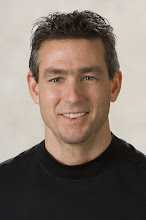
I have a friend doing a residency at a Chicago hospital. Seemingly more akin to a twisted form of professional hazing than actual education, the hours are brutal, the workload overwhelming, and the pressure intense.
As a small business owner it a troubled economy, I can definitely relate to this level of noise, but it reminded me of how intimidating fitness goals can be for a lot of folks.
And how ambiguous goals can be for regular exercisers.
The key, of course is to have a plan, prioritize well, and break the beast down into manageable chunks ... something ESPECIALLY true for health and fitness.
Whether you're new to exercise, or an seasoned gym rat veteran, the old adage "If you don't know where you're going any road will get you there" uniquely applies to health and fitness. 'Winging it' just isn't going to work if you need to loose 25, 35, or 55 pounds of body weight. The entire notion of getting from here to there can seem like an unmanageable beast. The mountain is just too big. It's insurmountable, intimidating, and beyond all hope.
But if broken down into smaller, more specific, stepwise goals, it suddenly becomes comprehensible and approachable.
So, if you've been procrastinating on starting a fitness program, or if you're currently exercising, but floundering a bit with your program, here are my Top 5 Tips for Getting Started and Staying Focused!
1. Define the ultimate goal of your fitness program. Recognize that once you get there you may find yet another height to reach, but think about what you want to ultimately look, feel, and move like in 5 years. Or 10 or 20. Dream big. Set the bar high. Write it down and share it with your best friend or closest family member. Having support from your fan club is a key element in reaching your ultimate health and fitness goals.
2. Define a 6 week goal every 6 weeks. This is what fitness professionals call a mesocycle: a shorter period of time where you focus on one or two very specific, yet smaller goals. For many people new to exercise (and new to our programs), some perfectly wonderful 6 week goals may seem entirely UNrelated to the ultimate goal. For example, if Mary wants to loose 50 pounds, good 6 week goals could include things like ...
- Making schedule adjustments to exercise 5 days per week, no excuses, or
- Completing 4 hours of cardiovascular exercise each week, or
- Eating a high protein breakfast every day of the week, or
- Doing as many pushups as she can 3 days per week, and getting to 10 nonstop pushups by the end of 6 weeks
3. Establish a goal for each and every workout. If designed properly, an exercise program will include short workouts, long workouts, low intensity workouts, moderate intensity workouts, and high intensity workouts each and every week. There's a time to add resistance, a time for recovery, and a time to work on flexibility. A time to push and a time to stretch. Define a daily workout goal. Ask yourself where your each workout fits into the weekly plan. Does it contribute to the 6 week goal? For example, if you've reached the end of a good week of training, and felt especially good about your high end stuff, resist the temptation to attack another high end workout ... plan for and complete the long, slow, cardio event if that's what's still needed on the week.
4. Recognize your Ultimate Goal when planning each mesocycle. Ask yourself how your 6 week goal directly contributes to your ultimate goal. Does it contribute to, or distract from your ultimate goal? For instance, I like to race my bikes in the summer. It gets competitive, and as a type A person, it's easy to get caught up in the competitiveness of the cycling world. But it isn't really my goal to be a highly competitive cyclist. It's a great goal for some people, but not my goal. My goal is to look, feel, and move like I'm 26 instead of 46! Bike racing helps keep my cardio training at a high level, which in turn helps to reduce body fat. But drifting into a higher level of competitive racing would require avoiding upper body resistance training, something that would actually undermine my ultimate goal.
5. Don't be afraid to change your ultimate goals on an annual basis. As a fitness professional of 25+ years, the one thing that I can tell you with absolute certainty is that you feel and think differently as you reach certain goals and ripen with age and wisdom. Unlike a lot of objectives where the goal is cross a finish line, with Health and Fitness, there is no finish line ... no matter where you are with your current fitness level, there's always something new to work on. Something new to pursue. Indeed, it's all about the journey, and there is no end.



1 comment:
Hey just joining, glad to be here! I'm glad to be right here ultimately, going to submit since I've been studying a prolonged time.
I've been involved in some other forums and have observed this location to have a lot much better content material, so it can make sense to eventually post!
BTW, what can I do to change the time zone for my account? It's kind of weird having the time like 5 hours off lol
Post a Comment